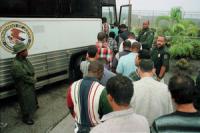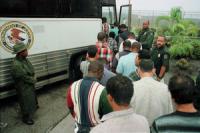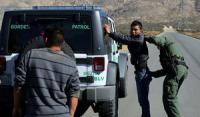-
Scientists say Trump's border wall would devastate wildlife habitat
There’s been a lot of debate about how effective the Bush-era border barrier has been at keeping out illegal crossers and drug smugglers. Some data indicates the barriers have encouraged people to cross in places where there isn’t one, and handprints on the existing border wall show that a determined person can still easily scale it. What the border fence has kept out instead, according to environmentalists, scientists, and local officials, is wildlife. Experts say that if President Donald Trump makes good on his promise to turn the border fence into a continuous, 40-foot concrete wall, the situation for wildlife along the border — one of the most biodiverse areas in North America — will only get worse. A mix of vehicle barriers and pedestrian fencing currently covers only about one-third of the nearly 2,000-mile U.S.-Mexico border – but even with all those gaps, the barriers have made it harder for animals to find food, water, and mates. Many of them are already endangered.
-
-
DHS has found only $20 million of the $21 billion needed for border wall

President Donald Trump’s pledge to use existing funds to launch the construction of a wall on the U.S.-Mexico border has run into an obstacle: There is only little money available to start the project. DHS has identified only $20 million that can be reallocated to the $21 billion project. DHS searched for available funds only within its $376 million budget for border security fencing, infrastructure and technology. Redirecting funds from other departmental accounts would require congressional approval. The funds currently available would cover 0.1 percent of the project’s cost — or pay to build 2.5 miles of border barrier.
-
-
Recent raids drive immigrant families to passport scramble
Two weeks ago, ICE arrested dozens of undocumented immigrants across the nation in what they said was a routine action. But the immigrant community was already on edge because of rising anti-immigrant rhetoric during the presidential campaign, and the ICE actions sent many undocumented families into a panic. Fearing deportation, immigrant families are crowding passport lines across Texas as undocumented parents seek U.S. passports for their American children.
-
-
Why mass deportations are costly and hurt the economy
President Donald Trump has pledged to deport several million undocumented immigrants and recently set a plan in motion targeting those with criminal records (of any kind). While the ethical issues with mass deportations have received lots of attention, the economics haven’t been explored as comprehensively. And the costs of mass deportations will likely be significant. Deportation-related economicfactors mean that the government must think carefully before aggressively pursuing undocumented immigrants. There are significant costs associated with deportations and the government should consider them carefully when weighing its policy objectives.
-
-
Mexico, rejecting Trump’s scheme, will only accept deportees who are Mexican nationals

A key element in President Trump’s deportation scheme is the deportation to Mexico of everyone crossing the U.S.-Mexico border illegally, regardless of the deportee’s nationality. The deportation scheme indicates that the United States expects Mexico to build detention facilities for the hundreds of thousands which will be deported. Mexican officials, in meetings with Rex Tillerson and John Kelly last Thursday, said that Mexico would not, under any circumstances, agree to accept and hold deportees who are not Mexican nationals.
-
-
Turkey completes half of its Syrian border wall
Turkey has completed more than half of a planned 317-mile wall along its border with Syria. The wall is not built as a regular wall would: It consists of portable concrete blocks, each weighing seven tons, placed next to each other. The concrete blocks are 6.5-foot thick at the base and 10-foot high. Each block is topped with three feet of razor wire. The government says the wall will improve security, but human rights groups warn refugees fleeing war will be tapped on the Syrian side.
-
-
Tech coalition fights DHS proposal to collect social media passwords
Earlier this week, the Center for Democracy & Technology announced the creation of a coalition of tech companies, NGOs, and privacy advocates to oppose efforts by DHS to collect social media passwords from individuals entering the United States. The coalition focuses on visa applicants who might be compelled to share their passwords under new DHS policies.
-
-
Mexicans worry Trump's deportation plan will see refugee camps emerge along border
There are growing worries in Mexico that Trump’s aggressive deportation scheme would lead to refugee camps popping up along the U.S.-Mexico border. Trumps plan called for an immediate start of deportation to Mexico not only of Mexicans – but of all Latin Americans and others who crossed into the United States illegally through Mexico. Earlier U.S. policy called for deportation to Mexico only of Mexican citizens, while “OTMs” – Other Than Mexicans – were flown back to their home countries.
-
-
Supreme Court considering case of Mexican boy killed by Border Patrol agent shooting across border
The Supreme Court appears to be evenly divided about the question of whether the Mexican parents of a teenager who was shot dead by a Border Patrol officer could use American courts to sue the Border Patrol agent who fired across the U.S.-Mexican border and killed their son. Lower courts dismissed the parents’ lawsuit – but the Supreme Court has taken up the case in order to determine whether non-citizens who are injured or killed outside the United States — by actions of an American from inside the United States — can pursue their case in American courts.
-
-
Trump administration directs Border Patrol, ICE to expand deportations

The Trump administration on Tuesday moved one step closer to implementing the president’s plans to aggressively rid the country of undocumented immigrants and expand local police-based enforcement of border security operations.
-
-
Details of Trump’s policy of massive deportations emerge

A couple of memos signed by DHS secretary John Kelly late last week offer details of the administration’s plans for what both current and former government officials describe as a massive roundup of undocumented immigrants. Immigration experts note that many of the ideas in Kelly’s two memos are already part of a bill passed by Congress in 1996 — but which policy makers from both parties, law enforcement agencies, and ICE officials disregarded because they considered these clauses in the bill as either unenforceable or absurd. The Kelly plan calls for hundreds of thousands of illegal border crossers who are not Mexicans — they are Guatemalans, Hondurans, Salvadorans, Brazilians, Ecuadorans, and Haitians – to be forced back into Mexico, and those among them who wish to apply for asylum in the United States would do so via videoconference calls with U.S. immigration officials from facilities in Mexico.
-
-
DHS considering using National Guard to round up unauthorized immigrants
A document obtained by the Associated Press show that the Trump administration is considering the option of mobilizing as many as 100,000 national guard troops to round up unauthorized immigrants, including millions living in states far from the U.S.-Mexico border. The AP reports that the 11-page memo, written by assistants to DHH secretary John Kelly, calls for the unprecedented use of national guard troops for immigration enforcement as far north as Portland, Oregon, and as far east as New Orleans, Louisiana. The document notes that most of the round up would take place in four states which border on Mexico – California, Arizona, New Mexico, and Texas – but that round ups would also occur in seven states which are contiguous to those four: Oregon, Nevada, Utah, Colorado, Oklahoma, Arkansas, and Louisiana.
-
-
Trump’s border plan for Canada? So far, not a wall
President Donald Trump has said little about the world’s longest undefended border – the one between the U.S. and Canada. The cooperative relationship between the U.S. and Canada is deeply institutionalized on both the economic and security fronts. But, while Canadians largely reject Trump’s rhetoric, the Canadian economy is heavily reliant on free trade with the U.S. This is a bargaining advantage that Trump is unlikely to ignore when he looks to renegotiate with his northern neighbor.
-
-
Immigrants picked up, but no massive raids, authorities say

U.S. and Mexican authorities are pushing back against reports of widespread raids that have sown panic in immigrant communities. But the “targeted operation” appears to be the largest of its kind since President Trump took office.
-
-
No link between immigration and increased crime: Research
Political discussions about immigrants often include the claim that there is a relationship between immigration patterns and increased crime. However, results of a new study find no links between the two. In fact, immigration actually appears to be linked to reductions in some types of crimes, according to the findings. “It’s important to base our public policies on facts and evidence rather than ideologies and baseless claims that demonize particular segments of the U.S. population without any facts to back them up,” says one of the researchers.
-
More headlines
The long view
Social Acceptance of Immigrants Working as Politicians or Judges Is Low
Often, the dominant society develops negative attitudes towards immigrants and their descendants because their integration is too successful – and not because they are unwilling to integrate. A possible explanation for negative attitudes towards successful immigrants could be the dominant society’s fear of immigrants occupying influential and value-based occupations. This applies, for example, for immigrants working in local politics or law.
